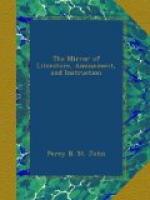The word “poor” is an epithet in very common misuse. It is often brought into play, especially in its plaintive sense, in situations, where, poor thing, it scarcely knows itself, and where there is not the slightest provocation to account for the use of it. It is degraded to the condition of a mere expletive; and, where there is a real good call for it, how often is it thrust upon the wrong person, the one who, were he consulted, would disclaim all compassion.
“Poor Mr. ——, only think of him, poor fellow! How very odd! I believe he was not in joke. He told me a distant connection of his, of another name, whom he never knew till after he heard that the thing happened, who had been transported to New South Wales a matter of sixteen years ago, is to be hanged to-morrow, by way of a secondary punishment, for coming back from transportation.”
The audience were profuse in their repetition of the epithet—generous to excess in the free gift of it to Mr. ——. They did not happen to consider it applicable to him who, for an unlawful love of native country, was to undergo a violent and disgraceful death.
This, to be sure, might be attributed to the feeling that so many good regular people have, that it is highly blameable to pity any man who suffers capitally for a breach of the law; that it would be, in some sort, to question the justice of the laws themselves. And the ten or a dozen honest souls that formed the company were probably so good themselves as to be justly scandalized at the notion of holding so much communion with guilt, as to sympathize with it in its sufferings. But I believe, after all, it was rather a flow of idiom than an effort of principle.
Mr. Small, a farmer, well to do in ——shire, fell ill of an acute and dangerous disorder. (By the by, every one was anxious to know if “poor” Mrs. Small’s husband was better.) He died,—Mrs. Small was, of course, in decent affliction. But the word of pity was always transferred from the principal sufferer to her, till he was beyond suffering. Then first it was bestowed on the “poor” corpse, which every one came to visit, and flattered as looking “pleasant.”
Mrs. Small herself, in the first letter of her widowhood, addressed to an intimate female friend, did not make a more judicious application of the favourite epithet. To this friend it was her habit to write once a quarter. We insert three passages; one extracted from each of these quarterly epistles, which followed in due succession after her sad bereavement:—
“Dear Nelly,—My brother-in-law has given the direction of the funeral to a good economical undertaker, by name Peebles. I have not seen him, and am not like; for he is in too large a way to attend himself, and he sends his man for orders, and to see all done handsome, but cheap.
“Poor Mr. Peebles’s man came here last night, and the funeral will be to-morrow. I am in much trouble, as might be expected. My poor new black bonnet is not come home, and keeps me fretting; but poor Peebles’s man says I shan’t be disappointed, even if he has to go for it himself. Poor Peebles’s man! he is up early and down late, to see all right. He was in my room this morning before I was out of bed, that all might be decent, &c. &c. &c. Yours to command, dear Nelly, MARY SMALL.”




